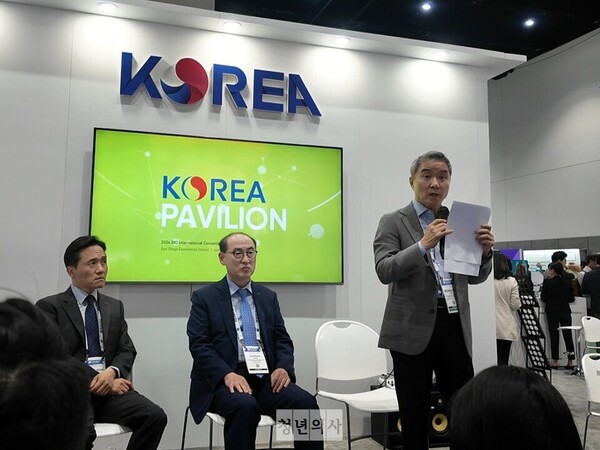SAN DIEGO, Calif. -- By Kim Chan-hyuk/Korea Biomedical Review correspondent -- Earlier this year, the U.S. introduced the Biosecure Act, a federal legislation, to prevent China's biotech companies from receiving U.S. federal funding, citing these companies as risks to U.S. national security. This has led to expectations that Chinese contract development and manufacturing organizations (CDMOs) such as Wuxi Biologics will face restrictions, and that Korean rivals may benefit from this. However, some experts noted that Korean companies cannot benefit from U.S. nationalism in the long term.
The BIO International Convention 2024 (BIO USA 2024), the world's largest pharmaceutical and biotech conference, kicked off at the San Diego Convention Center in San Diego, on Monday.
On the first day of the event, KoreaBIO and the Korea Trade-Investment Promotion Agency (KOTRA), jointly running the Korean pavilion, shared their achievements and discussed the latest trends.

“The recently reorganized governance of the U.S. Biotechnology Innovation Organization (BIO) is actively embracing (U.S.) government policies,” said Lee Seung-gyu, vice chairman of KoreaBIO. “With the U.S. strongly promoting the Biosecure Act as a national policy, it is crucial for Korean companies to respond effectively.”
Lee noted that not only companies with cGMP facilities such as Samsung Biologics and ST Pharm but new drug developers will have to overcome challenges related to FDA approval.
He mentioned that HLB, a Korean biotech firm, recently received a supplemental request letter (CRL) from the FDA regarding its liver cancer drug rivoceranib.
"Recently, HLB sought FDA approval for rivoceranib in combination with camrelizumab from Chinese company Jiangsu Hengrui Pharmaceuticals but received a CRL. There is some controversy regarding whether this decision was influenced by the U.S.-China conflict. The U.S. has not clarified this issue yet, so we need to examine it thoroughly,” Lee said.
Lee went on to say it was clear that Washington is pursuing policies that benefit American interests, ensuring U.S. human data remains within its borders and is protected. "We are concerned about the U.S.'s aggressive approach," he said. "To respond to this issue, efforts to secure bio-sovereignty are necessary.”
In Korea, this is currently being addressed by each government agency but it should be prioritized on the national agenda and thoroughly discussed, Lee added.
“Korean companies need continuous networking and support to excel in the global bio market,” said Park Sung-ho, head of KOTRA's North American office.
“We will cover the entire U.S. bio industry based on KOTRA New York and serve as a bridge between the needs of Korean companies and the needs of U.S. and global companies.”
According to KoreaBIO and KOTRA, the number of companies participating in the Korean pavilion this year has shown a significant increase compared to last year, which had 25 participants. In addition to the 26 companies that responded to the call for participation in the Korean pavilion, Seoul BioHub and Chuncheon Bio Industry Promotion Center are supporting 10 and 5 companies, respectively, bringing the total number of participating companies to 41.
Related articles
- [BIO USA 2024] Celltrion and Lotte Biologics' side-by-side booths effectively promote K-biotech
- [BIO USA 2024] Korean biotech giants take center stage at BIO USA 2024
- KoreaBIO to run largest Korean pavilion ever at BIO USA 2024
- [BIO USA 2024] Antibody drug market will keep growing: Samsung Biologics CEO
- GC Biopharma's drug for rare genetic disorder receives FDA fast track designation
- Bioplus-Interphex Korea 2024 kicks off in Seoul, showcasing biotech innovations
- Wuxi AppTec, WuXi Biologics boost lobbying spending amid rising US security concerns
- VC investments in Korea's biomedical sector rise by 15% year-on-year in H1
- HLB resubmits liver cancer drug application to FDA, awaits decision by early 2025
- HLB Group acquires enzyme producer GenoFocus
- New study spurs HLB to expand indications for its liver cancer drug rivoceranib
- HLB Group Chairman Jin buys HLB Innovation stock worth ₩280 million
- KHIDI leads Korea’s biotech push at BIO USA with investor forum and Boston pitch event

